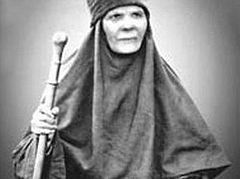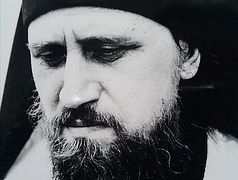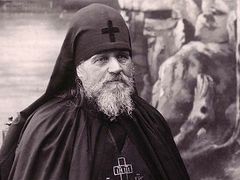Some of our readers have heard of the distant village of Zharki, located deep in Ivanovo Province in Russia. This was where Hieromonk Nestor served, who foreknew his own death at the hands of local icon thieves. Fr. Victor Saltykov, Hieromonk Joachim in monastic tonsure, served as a deacon with Fr. Nestor.
 Fr. Joachim and Nun Anna after their tonsure
Fr. Joachim and Nun Anna after their tonsure
On August 13, 2021, Hieromonk Joachim (Saltykov), a simple village priest, reposed in the Lord. He was an archpriest of the Church of the Nativity of the Most Holy Mother of God in a remote village of Zharki in the Ivanovo Region, and father-confessor of the Kineshma Seminary.
The majority of faithful who visited Batiushka or saw his films remember and know him as Archpriest Victor. Both Fr. Victor and his matushka, Natalia, were tonsured during Great Lent of 2018 and received the names of Joachim and Anna in monasticism.
A descendant of the Kuban Kossacks, with an undergraduate degree in physics, later a logging technician who defended a thesis called, “Protection of the Biosphere Reserve,” he worked as a forester on the Guzerreapl frontier of the Caucasian State Reserve, and spent years searching for “his Russia,”—a bona fide Russia deeply rooted in tradition—and his true calling.
For some time, Victor and his wife, a teacher and later an author of the textbook entitled, The Holy Relics of Russia, resided in Odessa, charged with the upbringing of so-called “problem children.” But city life wasn’t easy for them after years spent in the forest seclusion. So, in search of deep country stillness and after traversing areas in Central Russia and the Russian North, they ended up at the village of Zharki, the poorest (as stated by official statistics) settlement of the Russian Federation. And, like Fr. Victor used to recall later, they fit in. They “fit in” in this dying village, without decent road access even today, thanks to a local church and its young rector, Hieromonk Nestor (Savchuk; 1960–1993). That’s where their ten-year experience of living on the frontier, without electricity but with a well-established homestead, came in handy. Soon the church, where Victor was a custodian, had a cow, a horse, and a beehive that over time has become a large and small herd of cattle, a number of horses, and an apiary…
Four years later, on a Friday in December, Fr. Nestor was killed and Archbishop Ambrose (Shchurov) of Ivanovo and Kineshma offered Victor to become the church’s next rector. Realizing his unworthiness and lacking specific education, Victor nonetheless agreed, even if not right away, mostly out of hope to keep the church alive. As a former forester who has dealt with poachers more than once, he feared not the wicked people but the responsibility every clergyman holds before the Lord. But, as the past years have shown, Batiushka successfully coped with the obedience entrusted to him.
The fields before abandoned are now cultivated again, the old residents returned and new ones settled in. It so happened that the church, the regular services, and daily prayer breathed new life into the village already overtaken by nature, and into the human souls hardened by sin. Fr. Victor’s family and assistants among the newcomers set an inspiring example. Common morning and evening prayers, common meals (not all villagers could afford, especially in the 1990s, to have a wholesome meal), working together at the farmstead, and finally, general care for those who required urgent help.
Once again, Fr. Victor and Natalia had to deal with the troubled ones—not the kids this time but their “parents”, who had nearly lost their human appearance because of alcoholism and every possible sin arising from it. They founded shelter for children, adopting many among them, and bringing them up as worthy human beings. Every night, they would light a lantern atop the bell tower for those gone astray or who got lost. At midnight, they’d walk in a procession of the cross around the church accompanied by the ringing of the bells, and this would show the freezing travelers where to direct their steps.
Somehow it happened that not only the locals from nearby desolated villages flocked to Zharki, but also people from every corner of Russia, including both the successful and the troubled. Some sought spiritual guidance, others tried to stay for work, to gain strength and learn how to pray. Big names, as well as the “criminal element,” used to come to Zharki. For every one of them, Batiushka could find the right words and a proper assignment. No wonder that, after the Kineshma Diocese was founded in 2012, Bishop Hilarion of Kineshma and Palekh assigned Archpriest Victor as diocesan confessor, for he was a man who had acquired immense life experience and converted it into spiritual wisdom.
Batiushka’s work wasn’t always about staying out in the sticks. At various times, he shared his pastoral experience with the participants of the International Educational Christmas Readings. The audience familiar with the Orthodox documentary cinema knows him as the author and main character of such films as “The Russian Reserve,” “Lonesome Eden,” “Caucasian Front,” “Sober Up!” (which won an award at the Golden Warrior International Film Festival), and as a longstanding member of the award panel at the Radonezh International Festival of Orthodox cinema and TV Programs.
There is a reason why we recalled Fr. Victor’s cinematographic “acts.” With the assistance of Valery Timoschenko, a good friend and professional documentary filmmaker, he was able to capture and show that, through prayer and labor, a man can fix his life, because this was implemented in the village of Zharki, in particular. This life has a church of God in the center with a church community around it that is growing through an influx of newcomers of different backgrounds and characters—those who have already stepped on the path of salvation. Noah’s Ark, one of Batiushka’s favorite images, which he applied often in his conversations and sermons, saves those who need it and who can still be saved. The Ark depicts a truly Russian and Christian world order.
Fr. Joachim reached out a helping hand to a great many people, literally sheltering and feeding them and helping others find a path of salvation. Seeking nothing for himself in this life and overcoming all challenges, he was on his way to the Kingdom of Heaven, leading others who wished to find it; and even to the last days of his life and to his last bit of strength, he offered the Mystery of Confession to his flock.
No fewer than 200 laypeople and 20 clergymen arrived at the village of Zharki to bid farewell to the departed Hieromonk Joachim on Sunday, August 15.
God clothed his heart with the ocean of His love
“During his many years of service,” said Vladyka Hilarion during the eulogy, “Father Joachim earned the great love of those living not only in our region but also in the remote corners of our country. Even if such a possibility existed, this church couldn’t fit all those people whose lives he touched… God has clothed his heart with the ocean of His love. Let’s remember Fr. Joachim, his teachings and counsels, and let us be inspired by the example of his life and pray for him. I also hope that, just as he was our diocesan confessor, he will remain so, and keep praying for our clergy, his spiritual kin, and his loved ones. We pay Fr. Joachim our last respects, harboring no despair. Of course, we mourn, but there is neither desolation nor hopelessness. We lay the righteous man to rest. He goes where he strived to go throughout his life and he will be happy there. While we, like orphans, will ask him to pray for us.”
The Lord took Fr. Joachim like a staff of wheat ripened for the Kingdom of Heaven, setting him aside from all earthly cares on the seventy-fifth birthday of Nun Anna, his former spouse. The Lord also ordained that he appear before Him on the fortieth day after his repose, which will fall on the patronal feast of the church where Batiushka gave the best thirty years of his ascetic life.



